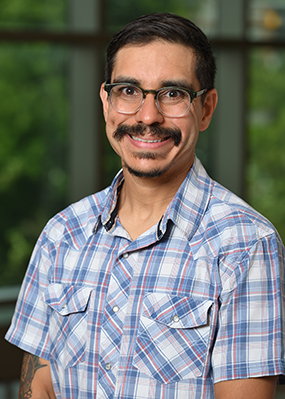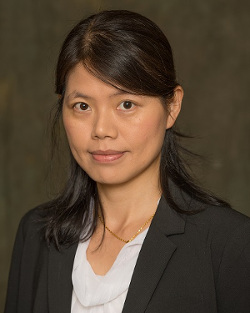Two NatSci faculty members honored as APS Fellows
Two faculty members in the Michigan State University College of Natural Science (NatSci)—Danny Caballero and Huey-Wen Lin—have been selected as 2022 Fellows of the American Physical Society (APS). This distinction recognizes researchers for significant and innovative contributions to physics. Each year, less than one-half of one percent of the APS membership earns fellowship status. Fellows are elected by the APS Council based on nominations from a candidate’s peers.

Caballero, a Lappan-Phillips Associate Professor of physics education in the Department of Physics and Astronomy, was recommended as an APS Fellow by the APS Topical Group on Physics Education Research (GPER). He was nominated for his foundational research on, and development of the role computation plays in physics education, and for his contributions to research on undergraduate and graduate education in physics.
“Being recognized by your colleagues in this way feels incredible,” Caballero said. “This APS fellowship acknowledges the contributions to the physics community that I have been fortunate to lead, advise, and collaborate on. I am proud of the work that I and members of the Physics Education Research Lab have done together over the past decade. I am very thankful for the love and support of my partner, and of my friends and family over these years.”
Caballero’s research in computation in physics informed the development of P-cubed, a computationally integrated, group-based, introductory physics course, and he led the development of pedagogies and curricula that contributed to overall instructional change at Michigan State University. His work on the growth of the Physics Education Research Lab at MSU, which he codirects, has been key to it becoming an international leader in physics education research.
In addition, Caballero conducts research as part of the newly-founded Computational Education Research Lab and holds an appointment as research faculty at the University of Oslo’s Center for Computing in Science Education.
“Danny has all of the best qualities in an APS Fellow; he is a key leader of a movement towards incorporating computation into the physics curriculum, both through research and advocacy,” said Eric Brewe, professor of physics and science education at Drexel University, who nominated Caballero for the honor. “This is really important work as it will help physics keep instruction fresh and relevant for the near future. In addition, Danny takes on this work in a thoughtful manner that invites people into physics. He is a great mentor to his students and an outstanding researcher.”
“I’m absolutely delighted that Professor Caballero received this honor,” said co-nominator, Brian O’Shea, a professor with joint appointments in the Department of Physics and Astronomy and CMSE. “It’s incredibly well-deserved. He has pioneered efforts in the understanding of computation in teaching, and in using data science techniques as education research tools. I’m truly honored to have him as a colleague in Physics and CMSE.”
Beyond his work on computation, Caballero has broken new ground using machine learning and tools of data science to drive research on undergraduate and graduate education in physics.
Caballero earned his B.S. in physics at the University of Texas at Austin and an M.S. in physics at the Georgia Institute of Technology before shifting his research focus to physics education and earning the first-ever PER-focused Ph.D. from Georgia Tech. He worked at the University of Colorado Boulder as a postdoctoral researcher before joining MSU in 2013 as an assistant professor in the Department of Physics and Astronomy.

Lin, an associate professor with joint appointments in the Department of Computational Mathematics, Science and Engineering (CMSE), and the Department of Physics and Astronomy, was recommended for the honor by the APS Division of Nuclear Physics, which cited her pioneering work in lattice-QCD (LQCD) calculations of the Bjorken-x dependence of quark and gluon distributions in the nucleon and pion that have led to rapid developments in the field, and outstanding contributions to cross-community efforts to combine lattice inputs with experimental data to advance quantum chromodynamics, or QCD.
Lin is an expert in LQCD, a field using high-performance computing to study quark and gluon properties of hadrons, synergizing with particle physics, nuclear physics, and computational science.
“It's such an honor to be recognized and to become an APS Fellow,” Lin said. “The work for which I was nominated is based on new ideas overcoming decades of obstacles, and it has been quite a journey. In the beginning, many were skeptical about the new method, and having to navigate doubts in the community was not always easy. I am proud of the students and postdocs who worked with me to realize this new research program. I also feel rewarded for the time I missed with my family to do this pioneering work. Many thanks to my husband, who has been very supportive.”
Keh-Fei Liu, professor of physics at the University of Kentucky nominated Lin for the APS Fellow honor. “I would like to congratulate Dr. Lin on this eminently deserved honor for her pioneering research in calculating the parton distribution function with lattice QCD and for her outsized involvement in professional services,” he said.
Lin’s successful research has been acknowledged with a National Science Foundation CAREER award in 2017 and a Cottrell Scholarship. She is a member of the Collaborative Theoretical & Experimental Studies of QCD (CTEQ) Collaboration, a member of the USQCD Executive Committee and a Topical-Group Convener for Snowmass Energy Frontier. She has served as lead-organizer or co-organizer for more than 20 International workshops, schools, conferences. In May 2022, she was elected to serve a two-year term on the Executive Committee of the American Physics Society Division for Nuclear Physics.
Lin is also a creator of the QCD mobile game Quantum 3, an outreach game to teach QCD to K-12 students, and the creator of “My Journey as a Physicist” podcast.
She also is a strong advocate for outreach and for diversity, equity and inclusion (DEI) efforts. She serves on the DEI committee for USQCD and International Lattice Conferences.
“Dr. Huey-Wen Lin is not only excellent in her own research field but has also set a great example for young researchers in her community as a strong advocate for DEI efforts in the LQCD community,” said Chien-Peng “C-P” Yuan, MSU professor of physics and Lin’s co-nominator. “Congratulations to her on receiving this well-deserved honor.”
Lin earned a Ph.D. in physics from Columbia University Graduate School of Arts and Sciences and her BS degree in physics from National Taiwan University School of Science. She joined the MSU Department of Physics and Astronomy in 2016 as a high-energy particle (HEP) theorist.
Banner image: MSU College of Natural Science (NatSci) faculty members Danny Caballero and Huey-Wen Lin have been selected as 2022 Fellows of the American Physical Society. Caballero was recognized for his foundational research on, and development of, the role computation plays in physics education, and for his contributions to research on undergraduate and graduate education in physics. Lin was recognized for her pioneering work in lattice-quantum chromodynamics (LQCD) calculations and outstanding contributions to cross-community efforts to combine lattice inputs with experimental data to advance QCD.